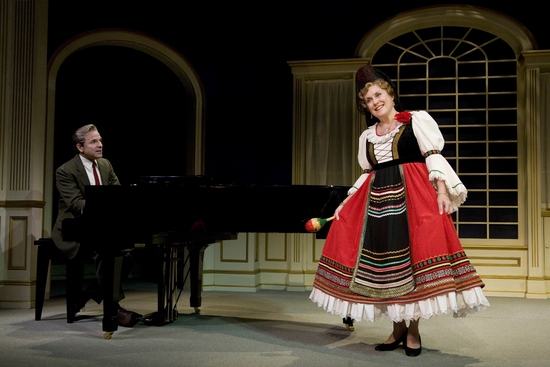
I laughed 'til I cried.
Souvenir prompts both reactions because, though its self-deceived coloratura heroine gives unbelievably bad vocal performances (except "in her head"), her pianist accompanies her to a relationship that's mind-changing and heartfelt.
In 1932, heiress Florence Foster Jenkins launched a "career" entertaining New York society with charity benefits at the Ritz-Carleton. With her accompanist Cosme McMoon, she gained ever larger audiences, made best selling (party) records, and finally parlayed her pitch-imperfect voice, assured manner, and overdone costumes into a sold-out concert -- her last, 1944 -- at Carnegie Hall.
Playwright Stephen Temperley's vision of the dippy diva comes via Cosme, playing piano in a bar with a drink to sip between recollections, in 1964. Recalling their first meeting in her classic Ritz suite, Cosme asks, "Why did she do it? Why did I do it?" The second question was easiest to answer: he needed the money. (When he stayed, he felt it was both for that and the time afforded between concerts to compose music, mainly songs.)
Jenkins' explanations for her singing foreswore vanity. She believed her many friends and their acquaintances liked and wanted to hear her. More importantly, charities benefited and great composers received appropriate homage, while her self-defined spirit, tone, and dignified show-womanship justified her confidence.
Though the play is about Jenkins, it's not just another biographical narrative with dramatized scenes. It's an authentic drama, with Cosme as both narrator and protagonist. Outside of their scenes together, he's a gay and satiric commentator; during the scenes when she sings or prepares to sing or seeks his reactions, he's her straight man. On his own, he struggles with his relationship to her and music.
With celebrity growing, Cosme questions his ability to write songs anyone wanted. He wonders about his career with Jenkins: "Is this IT?" He begins to admire the scale of her folly but reels at the prospect of Carnegie Hall. His description of the actual event and its reception by the public matches her indescribably hilarious depiction of it. Though the latter's a tad long, one would never wish to miss her dingy "Bell Song" (that Cosme has to identify for the raucous audience) or her mad "Laughing Song" (in which all join).
Only the laughter, stomping, clapping at her final appearance as an angel hailing the Virgin Mary disturbs her. (The angel costume recalls an album-cover picture of the real Jenkins and justifies the designer's flamboyant hand with all of the character's clothes and wigs.)
After the concert, Cosme comes forth to Jenkins insisting on the audience's friendly love for her, and thereby expressing his as well.
Now a consummate dramatic hero, he has changed while allowing her to remain herself. However, as a narrator, in the bar, he sums up their musical careers years after her death: "I'm relic. She's a myth." And the personification of camp.
Both amazing-as-bad-singer Judy Kaye (who has really terrific voice and presence) and Donald Corren (whose piano, singing, and acting are professionally spot on) come to Asolo recreating their original Broadway roles. It is hard to imagine anyone equaling them (though Souvenir seems to be sweeping the country and going abroad). The same is true of Vivian Matelon's fine direction. I'd have preferred a little less canned laughter during the Carnegie Hall scene, though, since the audience at Asolo provided more than enough. Recalling the show, I still much more than smile.
